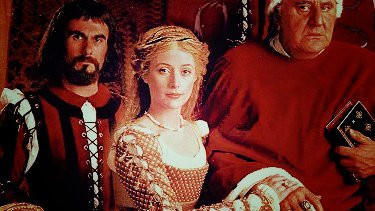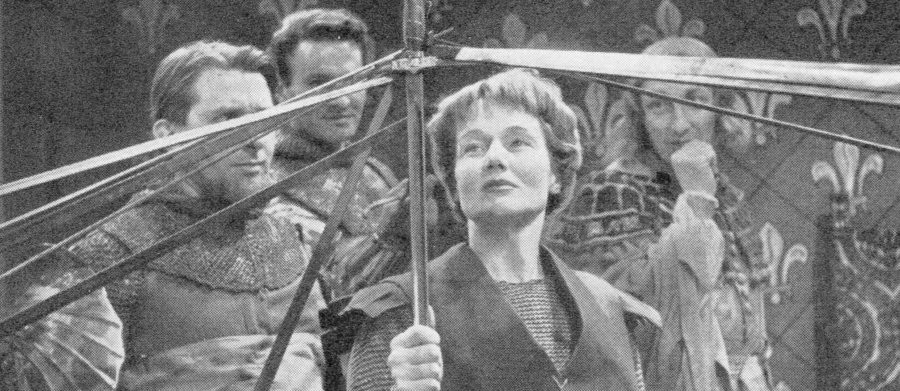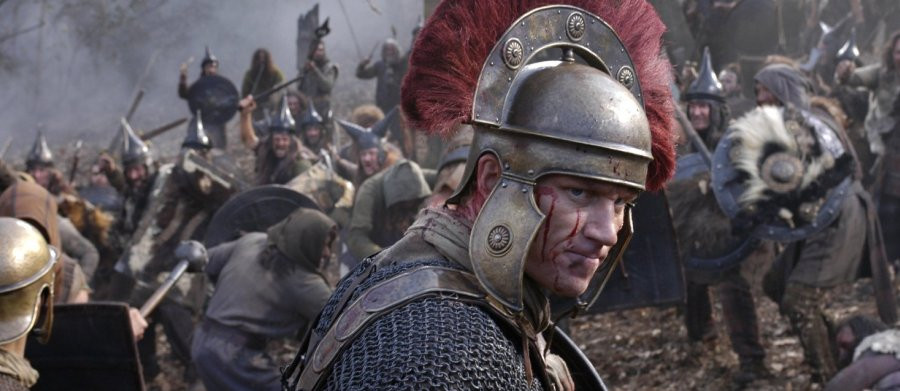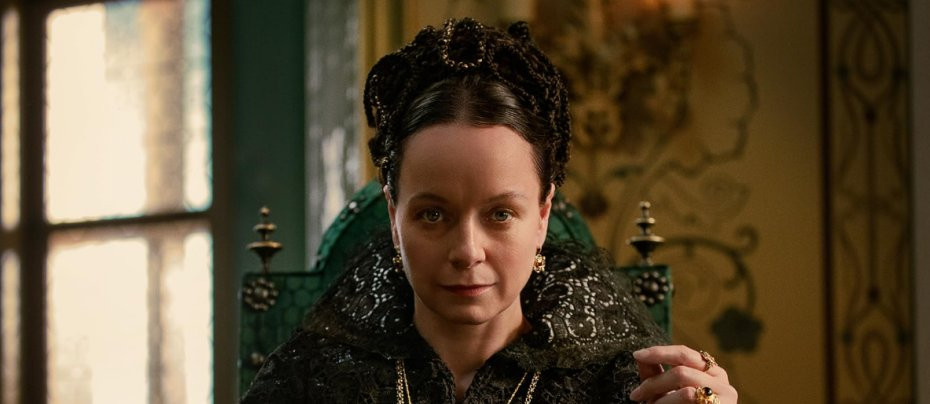
The Serpent Queen
2022 - United StatesReview by John Winterson Richards
Catherine de' Medici, Queen Mother of three successive Kings of France, has the reputation of being one of the great villainesses of history. Hers is the name that tends to be associated with the 1572 Saint Bartholomew's Day Massacre which used to be quoted as the classic example of religious bigotry and atrocity until the secular civilisation of the 20th Century put atrocity on an industrial scale. This may not be entirely fair: while the Roman Catholic Royal Family approved of the elimination of the rebellious Protestant leadership, most historians believe they lost control of the Paris mob and did not intend the wholesale slaughter that followed. One of the things The Serpent Queen gets right is that Catherine had, very skilfully, been following a clever policy of maintaining a careful balance of power between the Monarchy, the turbulent Protestant Huguenots, and the powerful Ultra Catholic de Guise family. Although the Royal Family felt obliged afterwards to try to front St Batholomew's out, the Massacre left them in a weakened political position.
Indeed, it’s possible to paint pre-1572 Catherine as a heroic figure, especially from a modern perspective. She is a very early example of a strong female leader. She seized the Regency of France in a brilliant manoeuvre at a time when reigning Queens were almost unknown: Mary had become England's first only a few years before and it was only a century since the French had won the Hundred Years War specifically on the principle that women should be excluded from the line of succession. It is highly probable that many of the worst accusations against Catherine had a genuinely misogynist element to them.

This provides wonderful raw material for a feminist historical drama. This is an overview of the first season of The Serpent Queen, a visually appealing attempt to exploit that material, which is let down by two conceptual mistakes.
The first is that, like much recent "historical" drama, it is only half historical and therefore less dramatic than it ought to be. It heightens the emotional impact of events if one knows that they actually happened, or at least might have happened. That is not the case with The Serpent Queen. It gets a lot right, but the astonishment that the viewer might feel at some of the strange things that really did occur is undermined by uncertainty when one sees how much the script got wrong.
This leads neatly in to the second conceptual problem with The Serpent Queen, its characterisation of Catherine. It is implied that some of the worst of those misogynist accusations had some foundation in truth. There is nothing ironic about the title of The Serpent Queen. Catherine is presented as a ruthless schemer on the lines of Dame Sian Phillips' unforgettable Livia in I, Claudius. The show suggests, with historical backing, that it was necessary that she became one in order to survive and protect her children, but she seems to be enjoying it a little too much, and even that does not excuse some of her cold-blooded manipulation which borders on the sadistic. It also has to be noted that the show does not take as much time as it should to illustrate her strong bond with her children, who function mostly as plot devices. The historical Catherine was practically a living cliche of the overprotective Italian mother, a fact that had profound consequences in French history.
Even worse is the suggestion that she really did dabble in witchcraft. Of all the false accusations against her, this is perhaps the most misogynistic and the most racist - the fact that she was Italian encouraging her French opponents to spread propaganda to the effect that she must therefore also be a poisoner. The truth is that she seems to have been a sincere Catholic: although it is almost obligatory on television now to show convents as oppressive, as The Serpent Queen does, Catherine seems to have been happy in one where she was brought up, and she remained a loyal, if sometimes pragmatic, defender of her faith throughout her life. While it is true that she retained an astrologer (played by Enzo Cilenti) in her service, that was common at the time - her contemporary Elizabeth I of England and Wales consulted the mysterious Dr John Dee - because astrology was then actually considered a legitimate science.
Quite apart from this demonisation of Catherine being anti-historical, it opens up a dramatic weakness: it makes it very difficult to sympathise with her as a protagonist. The writers seem to have realised this and it seems at first that our heroine is not Catherine herself but an apparently naive young serving girl to whom Catherine rather arbitrarily decides to tell her life story in "flashback" as part of a rather awkward framing device. The way that Catherine then proceeds to exploit and bully the girl makes her seem event more unsympathetic, even if the girl herself turns out to be more than the ignorant innocent she appears to be.

Samantha Morton is ideal casting for this Catherine, as she is written, even if she is much better looking than the original, which rather undermines her portrayal as a neglected wife. Blessed with the face of a slightly deranged angel, Morton excels at playing ambiguous characters who seem inexplicably a bit "off." Always an actress of great skill and nuance, she has matured into a strong presence who can command the screen without apparent effort as she does here. Again this can work against the characterisation in the early episodes when the emphasis is supposed to be on poor Catherine being oppressed. Liv Hill as the adolescent Catherine is better at conveying this aspect of the character.

The beautiful Ludivine Sagnier is well cast as Catherine's great rival, her husband's principal mistress, Diane de Poitiers. Diane became in effect the uncrowned Queen of France, so one can understand why Catherine, as the actual Queen of France, was embittered by how she was casually and publicly demeaned by her husband. However, the script errs in suggesting that Diane was already in effect his common-law wife at the time of his marriage, and in writing her as both a plotter and a bit of an airhead. The historical Diane was an extremely intelligent, practical, and cultured woman, and even at a distance of centuries, one can see how she captivated a King. She even seems to have tried to be kind to Catherine and persuade the King to tone down his mistreatment of his lawful wife. Of course, this is the story from Catherine's perspective so we see Diane only from the scorned wife's point of view.
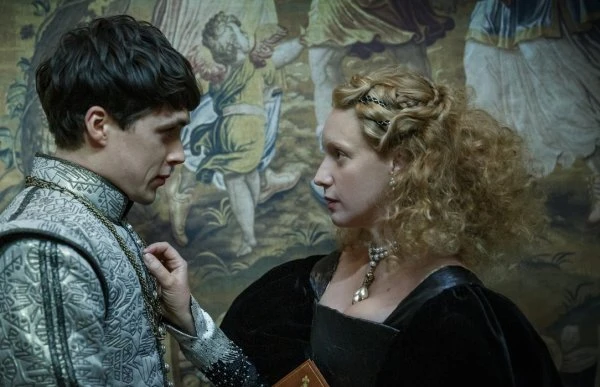
Colm Meaney is great value, as always, as Catherine's father-in-law, King Francis I. Yet he too is unfair to his historical counterpart. He gives us a pleasant, down-to-earth, slightly boorish King of France. The real Francis was far more sophisticated, the archetype of the Renaissance Prince, the close friend and patron of Cellini and da Vinci (Vasari claims that Francis even attended Leonardo's deathbed, a singular honour from a King). Charles Dance plays the Medici Pope Clement VII, Catherine's uncle, as the real-life Tywin Lannister he seems to have been. It was he who arranged Catherine's marriage into the French Royal Family, the culmination of the Medici's incredible century of social climbing (see our review of Medici: Masters of Florence), but her standing at the French Court crashed as soon as he died and the Medici gold dried up.
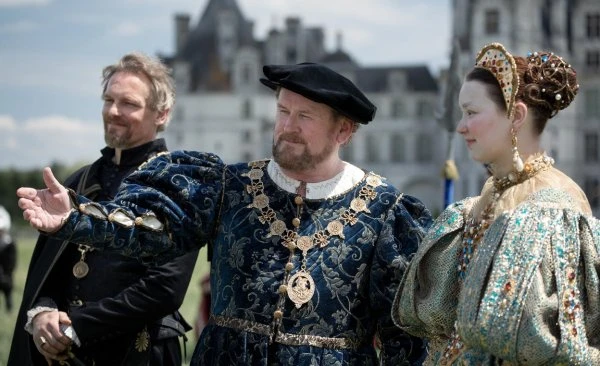
The Guise and Bourbon brothers, eventually the leaders of the two religious factions, the Ultra Catholics and the Huguenots respectively, seem to be played for laughs as dim aristocrats. They were nothing of the sort. Like much modern writing, the script does not seem to understand the depths of their religious convictions and so steers clear of this important aspect of their characters almost completely. At the same time, it fails to make it clear that the French "Wars of Religion" were not just, or even mainly, about religion. They eventually performed the same function as the Wars of the Roses, fought exclusively between practising Roman Catholics a century before in England and Wales, strengthening the central monarchy at the expense of the powerful provincial nobles (see our review of The White Queen). It was a missed opportunity not to show that she was the effective leader of a third faction, the 'Politiques,' the moderates who sought a compromise. One can only assume that they were omitted in order to present Catherine as a woman alone in the Privy Council. Needless to say, these sensible patriots ended up being despised by both extremes and Catherine is associated with their poor reputation, as well as being associated with the Ultra Catholics in Protestant propaganda: she could not win either way.

Beth Goddard is closer to history as the formidable mother of the Guise brothers, and grandmother to Mary Queen of Scots. Mary herself (Antonia Clarke) is presented as a power player in her own right at the French Court, a serious rival even to Catherine, when the fact is that Mary was very bad at politics and certainly not in Catherine's league. As it happens, Morton herself has also played Mary, in the feature film Elizabeth: The Golden Age, but that was not a script noted for its accuracy either. Rupert Everett goes Full Villain, as he tends to do these days, as the Holy Roman Emperor Charles V, which is unfair both to Charles V and to Everett.
The production values are excellent by television standards. The costumes are, as one often finds in recent films and shows, researched far more diligently than the scripts. Bear McCreary sets the scene with a fine score.
Best of all are the locations. Not only did the producers get permission to film at some of the most splendid of the fairytale castles of the Loire where many of the actual events took place, including Chenonceau, Chambord, Amboise, and Villandry, they also filmed in Marseille and at the Castel Gandolfo, the Pope's own Summer Palace.
One can, however, see hints of the television budget in details like the number of extras. A greater sense of the epic may be required in the upcoming second season, which will presumably include the beginning of the "Wars of Religion." Moreover, the lesson Starz should have learned from The Great, another show about a powerful Catherine, is that historical drama demands more than pretty locations and costumes. It needs a strong spine to its story. History offers a compelling one in the life of Catherine de' Medici and The Serpent Queen will succeed or fail in its considerable ambitions to the extent that it stays true to it.
Seen this show? How do you rate it?
Seen this show? How do you rate it?
Published on November 13th, 2023. Written by John Winterson Richards for Television Heaven.






